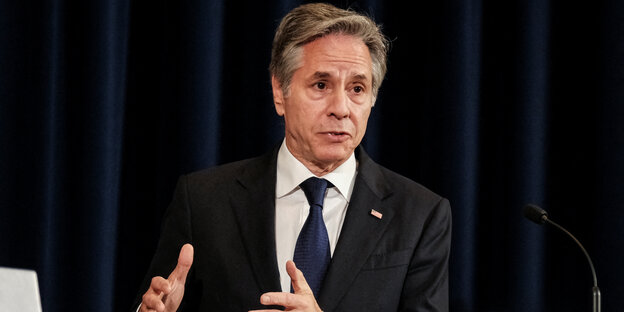Israel insists on an offensive in Rafah, the US government continues to call for a ceasefire. More aid supplies are arriving in the Gaza Strip.

Remains skeptical about Israeli aid promises: US Secretary of State Antony Blinken Photo: Michael A. McCoy/Reuters
US evaluates Israel's long-term humanitarian measures
The US government is taking a wait-and-see approach to Israel's commitments to improve the humanitarian situation in the Gaza Strip. “What matters is results: sustainable results,” Blinken said Tuesday at a news conference with his British counterpart, David Cameron, in Washington. “And we will pay close attention to this in the coming days,” Blinken emphasized.
According to Israel, many more aid supplies have arrived in the Gaza Strip in recent days. 468 trucks carrying humanitarian aid were inspected on Tuesday and taken to Gaza, wrote the Cogat authority, responsible for contacts with the Palestinians and humanitarian aid, on the X platform (formerly Twitter). “This is the largest number of trucks carrying aid supplies to the Gaza Strip in one day since the start of the war.” (dpa)
Biden on Netanyahu: “I think what he is doing is a mistake”
Meanwhile, Spanish-language broadcaster Univision aired an interview recorded last week with US President Joe Biden, in which he harshly criticized Netanyahu's actions in Gaza and urged a ceasefire. “I think what he's doing is a mistake,” Biden said. He was responding to a question about whether Netanyahu was more concerned about his political survival than Israel's national interests.
Biden continued: “So what I am demanding is that the Israelis now call for a ceasefire to allow full access to all food and medicine for the next six to eight weeks (…).” Some media outlets interpreted this statement as some kind of change. Of course, since Biden did not emphasize that the Islamist Hamas was responsible for the ceasefire. The White House made it clear that this was not the case.
“Our position does not change. “We call for an immediate ceasefire that would last at least six weeks under a hostage agreement,” the Israel Times a White House spokesman. Biden further emphasized in the interview: “I think there is no excuse for not meeting the medical and food needs of these people. This should happen now.” Biden spoke by phone with Netanyahu the day after the interview was recorded. According to the White House, in the conversation Biden threatened Netanyahu with consequences if Israel did not increase protection of civilians.
Israeli Defense Minister Galant said in a telephone conversation with his American counterpart Austin that Israel was still finalizing plans for the evacuation of civilians in Rafah, several Israeli media reported late Tuesday. A meeting with an Israeli delegation is planned for next week to discuss the US side's concerns about such an operation, US Secretary of State Blinken said in Washington on Tuesday. “I don't assume any action will be taken before these talks,” he stressed. “It is still believed that a major operation in Rafah would be extremely dangerous for civilians.” (dpa)
Hamas circles: Israelis not interested in ceasefire
Citing ongoing talks about a ceasefire and the release of hostages, Sullivan said Hamas' public statements were “not exactly encouraging.” However, there is still no response from Hamas to a proposal that is currently on the table, Sullivan said. He spoke to negotiating partners in Qatar and urged them to seek a response from Hamas. Hamas circles in Beirut, the Lebanese capital, said negotiations are currently “not going well.” The Israelis are only interested in the “hostage issue” and not a ceasefire. There is no official information on the status of the negotiations. After talks in Cairo, Hamas representatives left the Egyptian capital on Monday to hold consultations with its leaders. (dpa)
Israeli Army: Hezbollah positions in Syria attacked
Meanwhile, the Israeli army said it was once again attacking positions of the pro-Iran militia Hezbollah in Syria. As the army announced on Tuesday night, the military infrastructure of the militia was attacked, which, according to precise data from the intelligence services, was used “on the Syrian front.” “The Syrian regime is held responsible for all activities taking place on its territory,” he said. Initially, the information could not be independently verified.
Israel's air force repeatedly bombs targets in neighboring Syria in an attempt to prevent Iran and its allied militias, such as Hezbollah, from expanding their military influence in the country. Attacks have increased since the Gaza war began. Following the alleged Israeli airstrike on an Iranian embassy building in Syria a few days ago, Hezbollah stated that the attack would not be without consequences. Iran has also threatened retaliation. Iran is Hezbollah's biggest supporter. The militia fights Israel politically, but also with violence. (dpa)
Ireland wants to formally recognize a State of Palestine
Ireland has come out in favor of a two-state solution to the Middle East conflict and will soon formally recognize Palestine as a state. This was stated by Irish Deputy Prime Minister and Foreign Minister Micheál Martin on Tuesday afternoon in Dublin, according to media reports. Delaying recognition “is no longer credible or sustainable.” He said that he had held talks about recognition with other countries involved in peace initiatives in the Gaza war and that he intended to present a formal recognition proposal to the government once international discussions on the issue were completed. “But have no doubt: the recognition of a Palestinian state will occur.”
The EU member's government has been among the critics of Israel's actions in the Gaza Strip since the start of the war. (dpa)